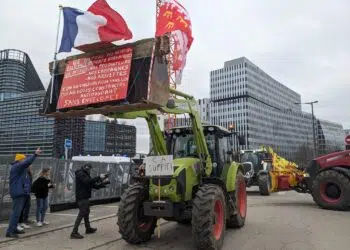Brussels – Fewer conditionality requirements for accessing CAP funds; halving the number of farm visits by national administrations; and clarifying the use of the concept of force majeure and exceptional circumstances to avoid penalties: These are some of the short- and medium-term measures the European Commission is proposing to reduce administrative burdens for European farmers, contained in an informal document transmitted today to the Belgian EU presidency and which will be on the EU Agriculture Council’s table Monday to contribute to the debate. It does not rule out the idea that “proposing changes should be considered” to the new Common Agricultural Policy, which was agreed upon by Parliament and the Council in 2021 and did not enter into force until 2023, after a two-year transitional period of about €336 billion until 2027 (about 31 per cent of the EU’s multi-year budget). The Commission President, Ursula von der Leyen, anticipated the bureaucratic simplification measures in a press conference at the end of the Feb. 1 extraordinary European Council, enlivened by protests by farmers and tractors a few dozen metres from the Palace where the leaders were meeting.
Belgian Agriculture Minister and EU rotating President, David Clarinval, has called on the 27 governments to submit their suggestions for reducing administrative burdens by Feb. 14 to contribute to the debate that will take place at Monday’s Council meeting, which von der Leyen herself has been invited to attend. While European ministers will seek common ground for an agreement, a farmers’ demonstration with some 1,500 tractors is expected in the European Quarter to protest EU policies. This was reported by Belgian police to the rotating EU presidency, informing it that the farmers’ demonstration will go on from 8 a.m. to 6 p.m. in the European Quarter. The police will deploy “substantial forces in the neighbourhood to contain possible disturbances,” and the “security perimeter that the police will put in place will depend on the scale of the demonstration and the evolution of the situation throughout the day.”
Among the immediate measures under consideration, Brussels—after granting throughout 2024 the uncultivated land exemption—is now proposing to change the rules requiring former livestock farmers with large grassland areas, who were forced to switch to arable production due to market disruptions in the meat and dairy sectors, to convert their arable land back to permanent grassland. Secondly, the Commission proposes to halve the number of farm visits by national administrations and to clarify the use of the concept of “force majeure” and “exceptional circumstances” that allow farmers to avoid penalties when they cannot fulfil all CAP requirements.
Brussels opens to the revision of the CAP
Measures to be implemented in the immediate term, but not only that: In the informal document, the Commission looks ahead and also points to several medium-term measures that could ease the burdens on farmers, especially smaller ones, and says it is also considering “proposing amendments to the basic regulations of the Common Agricultural Policy agreed upon by the European Parliament and the Council in 2021,” to address their concerns. It, therefore, opens the door to an ahead-of-time review of the new CAP, which came into effect very late just a year ago. For example, one proposal could be to exempt small farms with less than 10 hectares from checks on compliance with cross-compliance requirements under the CAP to access direct aid. In any case, the measures under consideration by Brussels will be the focus of the EU Agriculture Council to be held in Brussels, which will once again be the setting for protests by farmers and trade associations that will gather just metres from the Europe Building. Precisely at Monday’s Council, Eunews learns, delegations from Italy, Romania, Slovakia, and Poland will raise an item among the “miscellaneous” on the agenda related to farmers’ protests and the future of the EU agribusiness sector.
In the informal document published today, the Commission further states that it will launch an online survey in March aimed directly at farmers to “identify their main sources of concern and to understand the sources of administrative burdens and complexities arising from the rules of the CAP, as well as their implementation at the national level. The survey will provide a clearer picture of the main administrative obstacles perceived and faced by farmers as early as this summer. The results will be included in a more detailed analysis to be published in the fall of 2024.
“The Commission remains fully committed to providing solutions to alleviate the pressure currently felt by our hard-working men and women farmers,” von der Leyen commented in a note, assuring that “we are easing administrative burdens on our farmers to help them ensure food security for European citizens. Simplifying our agricultural policies is a constant priority, both at the EU and national levels. With this range of actions, we are delivering on our commitment to our farmers to accelerate this discussion.”
English version by the Translation Service of Withub






